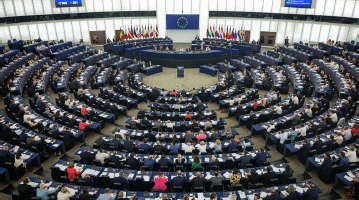The Public Enterprise Morsko Dobro from Budva is widely seen as the main force undermining the authentic coastal way of life, provoking strong opposition from residents and political representatives of coastal municipalities who refuse to tolerate this any longer.
This was the central message at the “We Won’t Give Up Belane” protest held at the southern part of the popular Belane beach in Tivat a place where generations of locals have grown up and practiced traditional coastal activities like fishing, sailing, and boating. The gravel shore has long served the local maritime community, and the recent decisions by Morsko Dobro have threatened this heritage.
The event was organized by an informal group of Tivat citizens and drew several hundred participants, including locals and some tourists who visit annually, attracted by the authentic local atmosphere. Sailboats lined the shore as music played and refreshments were offered by Caritas of the Kotor Diocese, which also used the occasion to raise funds for a seriously ill young man from Tivat. The protest included an underwater cleaning organized by local diving clubs, while sailing clubs, NGOs, civic, and environmental activists added energy to the gathering.
Participants ranged from young to old, including councillors and representatives from nearly all political parties in Tivat except the New Serbian Democracy party, whose members currently head Morsko Dobro and the Ministry of Spatial Planning and Urbanism. This ministry controls beach plans and temporary structures across coastal municipalities but frequently ignores local feedback and requests. Notably, Miljan Marković, president of the New Tivat Municipal Board and the Municipal Assembly, was the only senior official who did not support the protest.
The latest lease tender by Morsko Dobro leased the southern part of Belane previously a free public beach to the Podgorica-based construction company “Civil Engineer” until 2028. Although municipal plans designate this area as a “zone for sports and recreation,” Morsko Dobro allowed its conversion into a commercial beach where the leaseholder can charge for beach furniture. This decision angered Tivat residents and local authorities alike.
Tivat’s mayor Željko Komnenović, unable to attend due to urgent government duties, sent a written statement. When municipal spokesperson Branka Čelanović announced his absence, the crowd initially expressed disappointment, but applause followed as his message was read aloud.
Komnenović denounced Morsko Dobro referred to by locals as “Morsko zlo” (Sea Evil) for continuing a rigid, non-transparent approach to coastal management despite democratic changes in 2020. He argued that spatial management is constitutionally the responsibility of municipalities, not a centralized state enterprise. Leaders from all six coastal municipalities agree that Morsko Dobro should be abolished and transformed into a regulatory body, with coastal management returned to local authorities to protect public interests.
Rather than cooperating, Morsko Dobro’s leadership has launched political campaigns defaming municipalities, especially Tivat, following justified criticism of unregulated temporary structures and beach leasing as the tourist season began.
Regarding Morsko Dobro’s financial ties to Tivat, Komnenović highlighted that while the enterprise earns around 1.7 million euros annually from the area, it has invested only 250,000 euros in the coastal promenade project far less than the municipality’s own 700,000-euro contribution, accompanied by delays and excuses. He questioned how Morsko Dobro could lease a public beach to “Civil Engineer,” which had a poor track record supervising projects. Despite requests to allocate parts of the beach for water sports and family use, Morsko Dobro allowed its commercialization.
Komnenović stressed this was just the latest example of Morsko Dobro acting against Tivat’s interests, enabling its partners to harm the environment or monopolize public infrastructure. The local community is now fighting to preserve the public nature of Belane, just as they did successfully with the larger Ponta Seljanova beach.
He also questioned Morsko Dobro’s controversial partnership with a local company “Korleone,” which was granted a parking lot at Seljanov through questionable means, despite the municipality having sealed an illegal wall around Waikiki beach owned by the same company. Moreover, Kalardovo beach, awarded the Blue Flag by Morsko Dobro, is being damaged by concrete embankments without contract termination for the leaseholder.
Komnenović concluded that Tivat, like other coastal municipalities, demands the abolition of “Morsko zlo” and the return of coastal management to local communities. He promised this protest would be the first in a series opposing Morsko Dobro’s policies.
Written by our correspondent A.A.



